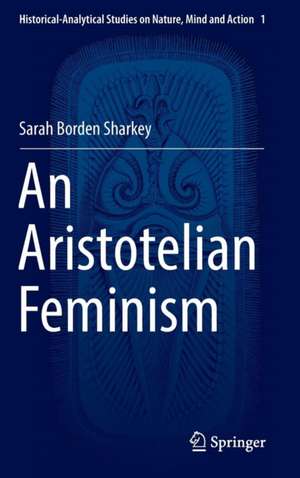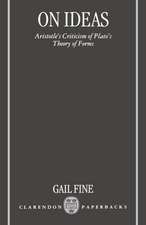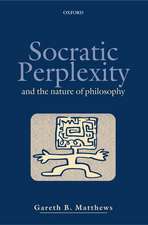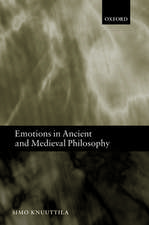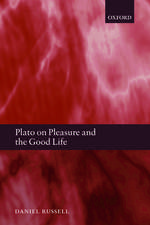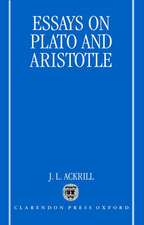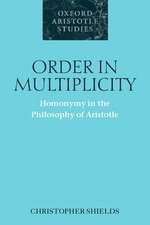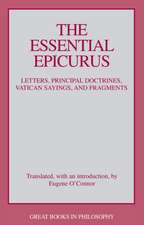An Aristotelian Feminism: Historical-Analytical Studies on Nature, Mind and Action, cartea 1
Autor Sarah Borden Sharkeyen Limba Engleză Hardback – 11 aug 2016
This work builds on Martha Nussbaum’s ‘capabilities approach’ in a more explicitly and thoroughly hylomorphist way. The author shows how Aristotle’s hylomorphic model, developed to run between the extremes of Platonic dualism and Democritean atomism, can similarly be used today to articulate a view of gender that takes bodily differences seriously without reducing gender to biological determinations.
Although written for theorists, this scholarly yet accessiblebook can be used to address more practical issues and the final chapter explores women in universities as one example. This book will appeal to both feminists with limited familiarity with Aristotle’s philosophy, and scholars of Aristotle with limited familiarity with feminism.
| Toate formatele și edițiile | Preț | Express |
|---|---|---|
| Paperback (1) | 481.43 lei 6-8 săpt. | |
| Springer International Publishing – 22 apr 2018 | 481.43 lei 6-8 săpt. | |
| Hardback (1) | 584.58 lei 6-8 săpt. | |
| Springer International Publishing – 11 aug 2016 | 584.58 lei 6-8 săpt. |
Preț: 584.58 lei
Preț vechi: 687.74 lei
-15% Nou
Puncte Express: 877
Preț estimativ în valută:
111.86€ • 117.10$ • 92.56£
111.86€ • 117.10$ • 92.56£
Carte tipărită la comandă
Livrare economică 05-19 aprilie
Preluare comenzi: 021 569.72.76
Specificații
ISBN-13: 9783319298467
ISBN-10: 3319298461
Pagini: 170
Ilustrații: XIV, 167 p.
Dimensiuni: 155 x 235 x 13 mm
Greutate: 0.44 kg
Ediția:1st ed. 2016
Editura: Springer International Publishing
Colecția Springer
Seria Historical-Analytical Studies on Nature, Mind and Action
Locul publicării:Cham, Switzerland
ISBN-10: 3319298461
Pagini: 170
Ilustrații: XIV, 167 p.
Dimensiuni: 155 x 235 x 13 mm
Greutate: 0.44 kg
Ediția:1st ed. 2016
Editura: Springer International Publishing
Colecția Springer
Seria Historical-Analytical Studies on Nature, Mind and Action
Locul publicării:Cham, Switzerland
Cuprins
Chapter 1: Nussbaum, Capabilities, and Biology.- Chapter 2: An Aristotelian Account of Sex & Gender.- Chapter 3: Possibilities beyond the Bare-Bones.- Chapter 4: Why Aristotle was not a Feminist.- Chapter 5: How Aristotle might have become a Feminist.- Chapter 6: Women and the Universities.
Notă biografică
Dr. Sarah Borden Sharkey, Professor of Philosophy, Wheaton College, earned her Ph.D. from Fordham University. Her interests focus on the relevance of classical and medieval ideas for contemporary discussions. She has written extensively on Edith Stein, including Edith Stein, in the series Outstanding Christian Thinkers (Continuum, 2003) and Thine Own Self: Individuality in Edith Stein’s Later Writings (Catholic University of America Press, 2009), as well as a co-edited volume on Stein’s writings on Teresa of Avila (Institute of Carmelite Studies Publications, 2015).
Textul de pe ultima copertă
This book articulates the theoretical outlines of a feminism developed from Aristotle’s metaphysics, making a new contribution to feminist theory. Readers will discover why Aristotle was not a feminist and how he might have become one, through an investigation of Aristotle and Aristotelian tradition. The author shows how Aristotle’s metaphysics can be used to articulate a particularly subtle and theoretically powerful understanding of gender that may offer a highly useful tool for distinctively feminist arguments.
This work builds on Martha Nussbaum’s ‘capabilities approach’ in a more explicitly and thoroughly hylomorphist way. The author shows how Aristotle’s hylomorphic model, developed to run between the extremes of Platonic dualism and Democritean atomism, can similarly be used today to articulate a view of gender that takes bodily differences seriously without reducing gender to biological determinations.
Although written for theorists, this scholarly yet accessiblebook can be used to address more practical issues and the final chapter explores women in universities as one example. This book will appeal to both feminists with limited familiarity with Aristotle’s philosophy, and scholars of Aristotle with limited familiarity with feminism.
This work builds on Martha Nussbaum’s ‘capabilities approach’ in a more explicitly and thoroughly hylomorphist way. The author shows how Aristotle’s hylomorphic model, developed to run between the extremes of Platonic dualism and Democritean atomism, can similarly be used today to articulate a view of gender that takes bodily differences seriously without reducing gender to biological determinations.
Although written for theorists, this scholarly yet accessiblebook can be used to address more practical issues and the final chapter explores women in universities as one example. This book will appeal to both feminists with limited familiarity with Aristotle’s philosophy, and scholars of Aristotle with limited familiarity with feminism.
Caracteristici
Argues that, had Aristotle been faithful to his best insights, he would have been a feminist Presents a new version of the feminist that can help address significant social issues Offers the first substantive appropriation of Aristotle’s metaphysics for feminist purposes
